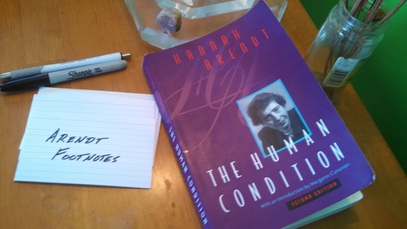 Arendt Footnotes #2
Arendt Footnotes #2 Just Do Id
Jeremy Bentham (1748-1832) and utilitarianism as “universalized egoism” are the focus today with International (a word Bentham coined) Women’s Day as the lens. Let’s begin with the Footnote, #72, first this time, from Arendt’s The Human Condition (bold added):
“72. … His [Bentham] chief objection is that utility is not measurable and there fore does not ‘lead us to the consideration of the number,’ without which a ‘formation of the standard of right and wrong’ would not be possible. Bentham derives his happiness principle from the utility principle by divorcing the concept of utility from the notion of usage (see ch. 1, par. 3). This separation marks a turning point in the history of utilitarianism. For while it is true that the utility principle had been related primarily to the ego prior to Bentham, it is only Bentham who radically emptied the idea of utility of all reference to an independent world of use things and thus transformed utilitarianism into a truly ‘universalized egoism’ (Halevey).”
 Hannah Arendt and Mother (1912)
Hannah Arendt and Mother (1912) Love piracy was something I learned in a political theory class at Purdue; it’s an open approach to knowledge (the text) while looking for things useful … oops, Arendt again. Today’s post is on utilitarianism, the famed theory of Jeremy Bentham that influenced world economics in the same way as Adam Smith and Karl Marx. Arendt is only footnoting this, speaking casually in a passing way, in regard to the utter vacuum within Bentham’s utilitarianism (where Nothing is ever useful).
Arendt notes that when Bentham derived “his happiness principle from the utility principle” he divorced it from usage; he had to in order to preserve a morality – a right and wrong. Yet there’s more; this divorce exposes (reveals) the culprit: the ego.
This too is Arendt as The Human Condition (THC) is a review of making; she focuses on the politics of making and ends up asking: is all of our making the problem?
She doesn’t stop there though; Arendt builds on the distinction between homo faber and animal rationale in THC; her work questions the making human (homo faber) as the future and suggests we take a clearer look (at ourselves) through the lens of animal rationale.
Id is Latin for “it.” Make It Happen, the theme for this year’s International Women’s Day, can also mean Make Id Happen – a focus on making things like water, food and shelter (animal basics) international priorities – for all of us.
Happy International Women’s Day All!
Today’s Video: First Lady Michelle Obama Honors International Women of Courage (8 March 2012)
Posted by Bryan W. Brickner
 RSS Feed
RSS Feed
